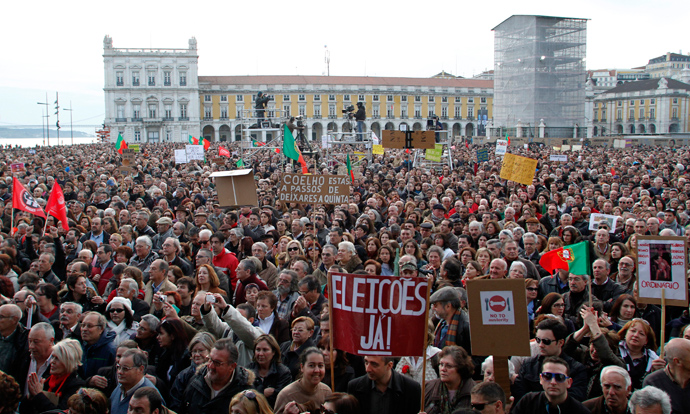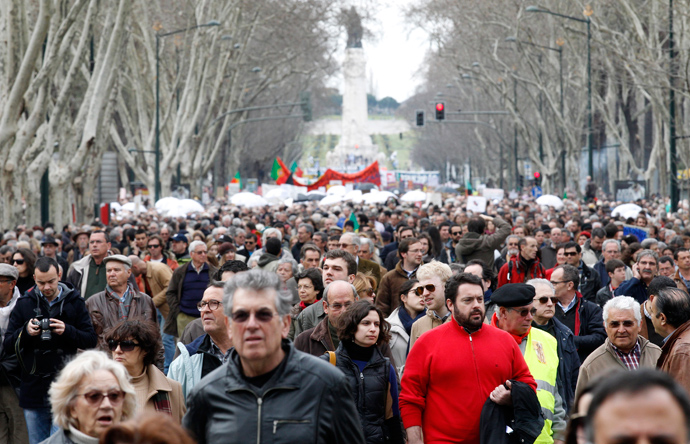Hundreds of thousands of people flooded the streets of Portuguese cities protesting austerity measures that the government hopes will help to avoid the bailout and lift the country out of recession.
Protests, coordinated through social media by nonpartisan groups, have swept across the country with the biggest mass demonstration taking place in the capital Lisbon.
Over 200,000 protesters filled a Lisbon boulevard leading to the Finance Ministry. Many of them were carrying placards and chanting "It's time for the government to go!" and "Screw the Troika, we want our lives back," referring to the lenders from the European Commission, European Central Bank and International Monetary Fund.
People in the crowd sang 'Grandola,' a protest song from the 1974 'Carnation Revolution' that ousted the dictatorship established by Antonio Salazar, and brought an end to military rule in the country. During the past few week activists have sung the song to heckle government ministers making public speeches.
What the protesters are demanding is a complete change of the government’s policies aimed at reviving Portugal’s economy as the country faces its worst recession since the 1970s.

Demostrators shout while taking part in a march against government austerity policies in Lisbon March 2, 2013 (Reuters / Hugo Correia)
The main reasons of mass protests are an increase in taxes and cuts in public wages imposed by the “Troika” of lenders in exchange for the 78 billion euro bailout, agreed in mid-2011. The measure pushed unemployment to record levels of 17 per cent.
"People are desperate, seeing their incomes fall sharply, their families and friends without jobs," the WSJ quoted a 49-year-old journalist and one of the protest organizers, Nuno Almeida.
On Thursday Portugal's Prime Minister Pedro Passos Coelho promised more spending cuts as a part of a deep reform of the state, which, he said, is necessary to make lower taxes possible in the future.
"This government has left the people on bread and water, selling off state assets for peanuts to pay back debts that were contracted by corrupt politicians to benefit bankers," Reuters quotes one of the protesters said a movie-maker, Fabio Carvalho. "If not today, things have to change tomorrow and we need to remain in the streets for the government to fall."
The rallies were organized in Lisbon, Porto and several dozen other cities via the Internet by a group of activists known as Que Se Lixe a Troika, or Screw the Troika, Reuters reports.
These demonstrations coincide with a quarterly review by the EU/IMF bailout inspectors.

People gather to protest against government austerity policies at Lisbon's main square Praca do Comercio March 2, 2013 (Reuters / Hugo Correia)

Demonstrators shout while taking part in a march against government austerity policies in Lisbon March 2, 2013 (Reuters / Hugo Correia)

People shout slogans as they take part in a protest against government austerity policies at Lisbon's main square Praca do Comercio March 2, 2013 (Reuters / Hugo Correia)

People march against government austerity policies in Lisbon March 2, 2013 (Reuters / Jose Manuel Ribeiro)

People shout slogans as they take part in a protest against government austerity policies at Lisbon's main square Praca do Comercio March 2, 2013 (Reuters / Hugo Correia)
No comments:
Post a Comment